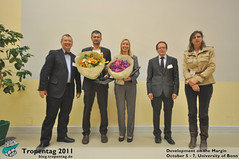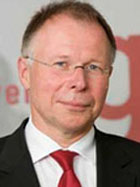food security
Research in Africa Wins Award
Wed, 10/05/2011 - 18:29 — De-Registered User
Andrea Bues and William Leiser win the Hans H. Ruthenberg-Graduate- Award 2011.
 Bues was awarded 2500 Euros for her master thesis work in Ethiopia, which focused on institutional analysis of agricultural foreign direct investment, water rights and conflicts. A student of Humbolt University, Berlin, Bues' research was able examine how access to water resources can contribute to alleviating poverty.
Leiser from University of Hohenheim, won 2500 Euros for his work in Mali. He studied the variation for adaptation of sorghum to low phosphorous soils. His research is an effective contribution towards the reduction of hunger and improvement of food security.
This award is given by the Fiat Panis Foundation. This year's jury members comprised of Prof. Tilman Brueck (Humboldt-University of Berlin), Prof. Ulrike Grote (University of Hannover) and Prof. Joachim Sauerborn (University of Hohenheim). The jury decided the award based on scientific excellence, innovation and applicability.
(By : Priyanka Parvathi and Divya Rajeswari Swaminathan)
Bues was awarded 2500 Euros for her master thesis work in Ethiopia, which focused on institutional analysis of agricultural foreign direct investment, water rights and conflicts. A student of Humbolt University, Berlin, Bues' research was able examine how access to water resources can contribute to alleviating poverty.
Leiser from University of Hohenheim, won 2500 Euros for his work in Mali. He studied the variation for adaptation of sorghum to low phosphorous soils. His research is an effective contribution towards the reduction of hunger and improvement of food security.
This award is given by the Fiat Panis Foundation. This year's jury members comprised of Prof. Tilman Brueck (Humboldt-University of Berlin), Prof. Ulrike Grote (University of Hannover) and Prof. Joachim Sauerborn (University of Hohenheim). The jury decided the award based on scientific excellence, innovation and applicability.
(By : Priyanka Parvathi and Divya Rajeswari Swaminathan)
 Bues was awarded 2500 Euros for her master thesis work in Ethiopia, which focused on institutional analysis of agricultural foreign direct investment, water rights and conflicts. A student of Humbolt University, Berlin, Bues' research was able examine how access to water resources can contribute to alleviating poverty.
Leiser from University of Hohenheim, won 2500 Euros for his work in Mali. He studied the variation for adaptation of sorghum to low phosphorous soils. His research is an effective contribution towards the reduction of hunger and improvement of food security.
This award is given by the Fiat Panis Foundation. This year's jury members comprised of Prof. Tilman Brueck (Humboldt-University of Berlin), Prof. Ulrike Grote (University of Hannover) and Prof. Joachim Sauerborn (University of Hohenheim). The jury decided the award based on scientific excellence, innovation and applicability.
(By : Priyanka Parvathi and Divya Rajeswari Swaminathan)
Bues was awarded 2500 Euros for her master thesis work in Ethiopia, which focused on institutional analysis of agricultural foreign direct investment, water rights and conflicts. A student of Humbolt University, Berlin, Bues' research was able examine how access to water resources can contribute to alleviating poverty.
Leiser from University of Hohenheim, won 2500 Euros for his work in Mali. He studied the variation for adaptation of sorghum to low phosphorous soils. His research is an effective contribution towards the reduction of hunger and improvement of food security.
This award is given by the Fiat Panis Foundation. This year's jury members comprised of Prof. Tilman Brueck (Humboldt-University of Berlin), Prof. Ulrike Grote (University of Hannover) and Prof. Joachim Sauerborn (University of Hohenheim). The jury decided the award based on scientific excellence, innovation and applicability.
(By : Priyanka Parvathi and Divya Rajeswari Swaminathan)
Meet the Speakers: Dr. Hans-Joachim Preuß
Wed, 07/13/2011 - 18:31 — De-Registered User Hans-Joachim Preuß is the Managing Director of the Deutsche Gesellschaft für Internationale Zusammenarbeit (GIZ). He holds a PhD from
Justus Liebig University in Giessen, under the topic of target group-oriented agricultural research in developing countries.
Dr. Preuß started his professional career in development cooperation at the GTZ, holding various positions in Africa and at the GTZ Head Office in Eschborn, also as a member of the Corporate Development Unit. He was transferred at Welthungerhilfe in Bonn, where he was initially in charge of the Programmes and Projects Department and later Secretary General and Managing Director. In 2009, Dr Preuß was appointed Managing Director of GTZ.
Hans-Joachim Preuß is the Managing Director of the Deutsche Gesellschaft für Internationale Zusammenarbeit (GIZ). He holds a PhD from
Justus Liebig University in Giessen, under the topic of target group-oriented agricultural research in developing countries.
Dr. Preuß started his professional career in development cooperation at the GTZ, holding various positions in Africa and at the GTZ Head Office in Eschborn, also as a member of the Corporate Development Unit. He was transferred at Welthungerhilfe in Bonn, where he was initially in charge of the Programmes and Projects Department and later Secretary General and Managing Director. In 2009, Dr Preuß was appointed Managing Director of GTZ.
Rushing for land
Tue, 05/03/2011 - 09:09 — De-Registered User
Food prices are 36% above the levels of a year ago and remain close to the 2008 peak, driven in part by higher fuel costs connected to instability in the Middle East and North Africa. With current double digit food price inflation in crisis-striken Egypt and Syria, a major World Bank report shows wheat, maize and soya costs have soared, requiring a relaxation of grain export controls and a rethink on biofuels.
"Already 44 million people have fallen into poverty since June 2010. If the food price index rises by just another 10% we estimate another 10 million people that fall into extreme poverty. And a 30% increase would add 34 million more people to the world's poor, who now number 1,2 billion" said World Bank President Robert Zoellick while presenting the World Bank's Food Price Watch last month.
Eager to capitalise on rising food and energy prices or shore-up their own country's food security, foreign investors are pouring in to lease or buy huge tracts of cheap land that governments have cleared of people in the developing world. This high-stakes global land rush is essentialy a third wave of outsourcing and is taking place in the largest recipient countries of humanitarian food and development assistance. From Ethiopia's lowlands to the hilltops of Madagascar, vast tracts of farmland and forests are being gobbled up by foreign investors creating super-sized farms.
"Yam endangered and under-researched" says important African food crop
Mon, 09/27/2010 - 13:41 — De-Registered User
Do we know enough about all crops of the world before we step into teasing evolution within the pool of a tiny number of species? Not well discussed and not well understood, an important tropical crop in Africa and other parts of the world reports:
"Yam not a grain, yet I feed 60 million people every day. Yam a productive and valuable crop for farmers, getting as large as 2.5 meters long and weigh up to 70 kilograms. However, you know so little about how much I can give".
Read the full story about the efforts of the Global Crop Diversity Trust (GCDT) for saving endangered yams in this month's Scientific American.
- « first
- ‹ previous
- 1
- 2
- 3




